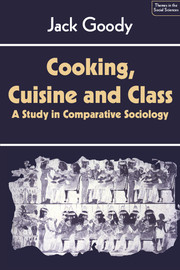Book contents
- Frontmatter
- Contents
- List of illustrations
- Preface
- Dedication
- 1 Intentions and remarks
- 2 State of play
- 3 Production and consumption among the LoDagaa and Gonja of northern Ghana
- 4 The high and the low: culinary culture in Asia and Europe
- 5 Industrial food: towards the development of a world cuisine
- 6 The impact of the world system
- 7 Cooking and the domestic economy
- Appendix: Terms, operations and cognition
- Notes to the text
- Bibliography
- Index
- BY THE SAME AUTHOR
Appendix: Terms, operations and cognition
Published online by Cambridge University Press: 05 June 2012
- Frontmatter
- Contents
- List of illustrations
- Preface
- Dedication
- 1 Intentions and remarks
- 2 State of play
- 3 Production and consumption among the LoDagaa and Gonja of northern Ghana
- 4 The high and the low: culinary culture in Asia and Europe
- 5 Industrial food: towards the development of a world cuisine
- 6 The impact of the world system
- 7 Cooking and the domestic economy
- Appendix: Terms, operations and cognition
- Notes to the text
- Bibliography
- Index
- BY THE SAME AUTHOR
Summary
The source of the data used for ‘semantic’ analysis of the kind undertaken by Lévi-Strauss and other scholars is not always clear. That is to say, there is no necessary assumption that notions such as ‘culture’ and ‘nature’ are always present as specific linguistic categories; even in the study of ‘category systems’ evidence for inclusion is drawn from a wider array of data, which clearly raises the question of the actor/observer status of the concepts.
Adrianne Lehrer has primarily been concerned with the analysis of lexemes. In her first study (1969) she used the set of English cooking terms to test two semantic theories, the field theory of Lyons and the componential theory of Katz and Fodor. A later paper (1972) extends the attempt to eight other peoples, including the French and the Yoruba, and takes into account the culinary triangle and triangle of recipes developed by Lévi-Strauss.
The first problem is the need to establish the notion and existence of a set. The argument is familiar. Speech has its own code for behaviour and things, e.g. verbs for actions, nouns for objects, etc., which provide the basic categories for most thought and most communication that human beings undertake. The words (morphemes or lexemes) used in sets of related activities (e.g. cooking) or objects (e.g. animals) may constitute formal sub-systems of the kind that have become familiar in the analysis of colours and of kinship.
- Type
- Chapter
- Information
- Cooking, Cuisine and ClassA Study in Comparative Sociology, pp. 216 - 220Publisher: Cambridge University PressPrint publication year: 1982



